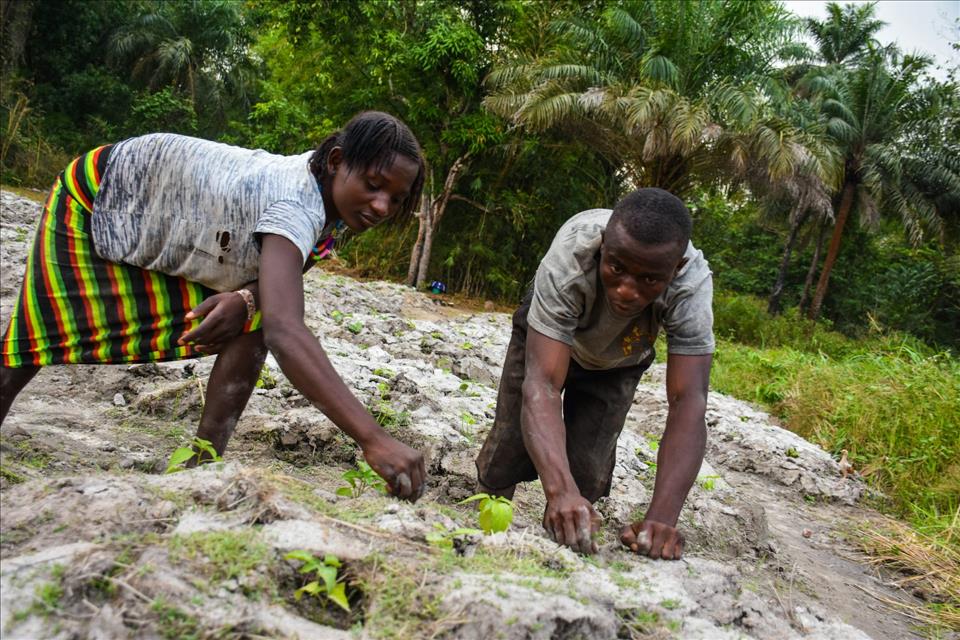
It's Hard For Women In Sierra Leone To Own Land Here's Why
They have an impact on livelihoods, hinder development and contribute to social unrest.
One community that serves as a microcosm of these disputes is Grafton, 32km east of the capital, Freetown. This is where I've been carrying out research for my PhD , focusing on women's access to land and sustainable livelihoods.
Grafton's proximity to Freetown and its role as a corridor for migration have attracted land speculators, leading to land grabbing and fraud.
The rate of development has outpaced traditional land management systems, creating confusion and conflict over rights to own and use land. Broader weaknesses in land tenure and justice systems also fuel the land disputes in Grafton.
Women in the Grafton community confront particular difficulties. Social conventions, cultural customs and legal frameworks that favour male property ownership and control frequently work against them.
When male heirs get preference, women are left with very restricted land ownership rights, even when they have helped to acquire or cultivate the land.
Land grabbers frequently target women, especially widows and single mothers, taking advantage of their precarious social and economic status.
Many women are unable to defend their land rights in court because they do not have access to legal aid.
My PhD research explores women's vulnerability to land disputes in Grafton. I argue that policymakers, civil society groups and international development agencies should work together on policies that will protect women's land rights.
Weak governance and multiple actorsMany Grafton residents do not have official land titles. Ambiguity about who owns the land can lead to conflicts and land grabs.
Land administration organisations and law enforcement are weak. Illegal land transfers, false titles, evictions and manipulated records can go unpunished.
Although traditional leaders have a big say in how land is used and allocated, their power clashes with official legal frameworks.
Confusion and inconsistency may result from overlapping authorities.
Cultural and social normsIn Grafton and many other parts of Sierra Leone, women are subject to cultural and societal conventions that frequently give preference to male land ownership and inheritance.
Women, particularly widows and daughters, have little to no inheritance rights under customary inheritance laws. Widows are frequently left without a source of income when their husband's land is not left to them.
Communities may exclude women who try to stand up for their land rights.
Many women don't know how to defend those rights, due to a lack of education.
Economic marginalisationLike many other women in the country, Grafton women experience severe economic marginalisation. It has a direct effect on their capacity to own property.
Many don't have collateral or formal jobs that would help them borrow money. It also means they are less able to invest in land improvements or buy land. The rising cost of land makes this even harder, especially in peri-urban areas where demand for land is high.
Their economic weakness makes women more vulnerable to land grabbing and other forms of exploitation.
Lack of legal awareness and access to justiceIt's difficult for women to defend their land rights when they lack legal knowledge and access to court systems.
The distance to courts and legal aid offices is a barrier . And legal bills and court costs are not affordable for many. Women may experience bias and discrimination in the legal system, which could result in unjust treatment and unsatisfactory legal counsel.
Violence and intimidationIn Grafton, women who stand up for their land rights frequently encounter intimidation and violence. From threats and verbal abuse to physical attack and property destruction, this violence can take many forms.
These violent crimes feed a culture of insecurity and dread. In public settings or during communal gatherings, women have experienced verbal abuse, insults and threats of violence.
Women are occasionally subjected to physical abuse, such as beatings and sexual assault. As a kind of intimidation, women may have their homes, farms or livestock destroyed or harmed.
Land disputes committeeThe Sierra Leone government established the Complaints Committee on Land Disputes in the Western Area to investigate complaints about land disputes concerning the state for the period between April 2018 and January 2021. The committee has now completed its work.
It made key resolutions, referred cases in court to the Ministry of Lands for adjudication, and made recommendations to strengthen land dispute mechanisms.
The Western Area includes Freetown and surrounding rural areas – Grafton among them.
The government acted in response to the increasing number of violent land disputes in the area.
The Complaints Committee had the potential to help women with their land tenure issues, though its actual effectiveness remains unclear.
The committee has now concluded its operations. Even during its active period, it faced challenges such as insufficient infrastructure, personnel and funding, which likely hindered its ability to effectively address land tenure issues, particularly those faced by women.
Delays and backlogs result from the committee's inability to manage a high caseload.
What's neededThe Grafton case study shows that preventing and solving land conflicts in Sierra Leone needs a multifaceted approach. It should do the following:
-
strengthen land tenure security
formalise customary land tenure systems through clear documentation give women equal access to land ownership and inheritance rights through legal reforms and awareness campaigns
make legal aid services accessible and affordable train legal professionals on gender-sensitive approaches to land rights and dispute resolution
improve women's economic independence through skills training and access to finance increase women's participation in decision-making processes related to land use and management.

Legal Disclaimer:
MENAFN provides the
information “as is” without warranty of any kind. We do not accept
any responsibility or liability for the accuracy, content, images,
videos, licenses, completeness, legality, or reliability of the information
contained in this article. If you have any complaints or copyright
issues related to this article, kindly contact the provider above.


















Comments
No comment